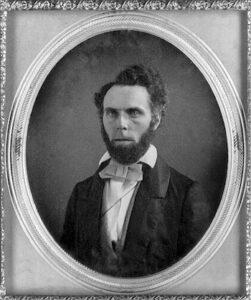
Henry Blackwell
*Henry Blackwell was born on this date in 1825. He was a white-American abolitionist and advocate for women's rights and social and economic reform.
Henry Blackwell was born in Bristol, Gloucestershire, England, the seventh of nine children of Samuel Blackwell and Hannah Lane Blackwell. In 1832, the family, including eight children and their father's sister Mary, emigrated to the United States. The family settled first in New York, where Blackwell's father established a sugar refinery, where the ninth child was born, and then just outside New York in Jersey City.
Blackwell's father, a sugar refiner whose livelihood conflicted with his abolitionist principles, experimented with making beet sugar as an alternative to slave-grown cane sugar. His father took an interest in the nascent abolition movement. William Lloyd Garrison and other movement leaders visited the family's home. After a fire destroyed the refinery and the Panic of 1837 destroyed the remaining resources, the family moved to Cincinnati in 1838, where Blackwell's father died, leaving the family destitute. Blackwell's mother, aunt, and three elder sisters opened a school in their home, while thirteen-year-old Henry and his brother Sam took clerking jobs.
In 1840, Blackwell was sent to Kemper College in St. Louis with the intent that he should become a lawyer. However, financial difficulties forced him to return home and resume clerking. Around 1845, he became a partner in a flour mill business, managing three mills' operations. Within a year, he had made enough profit to purchase a small brick house in Cincinnati's Walnut Hills section. Seeking a business where he might achieve financial independence, Blackwell next tried sugar refining. When that failed, a visiting English cousin persuaded him to accept a loan with which he and brother Sam purchased half interest in a Cincinnati wholesale hardware business.
In 1850 Blackwell became the traveling partner, making semi-annual two-month-long horseback journeys through Ohio, Indiana, and Illinois, selling hardware. Blackwell wrote poetry in his spare time and always carried several books to make every spare moment "useful" and "self-improving." He was a founding member of the Literary Club of Cincinnati. Through this club, Blackwell formed lasting friendships with men who played prominent roles in the history of Ohio and the nation. In Cincinnati, he met fellow activist Lucy Stone in 1850. Blackwell continued to follow Stone's work, eventually inviting her to be a speaker for a suffragist tour in 1853. Blackwell proposed to her numerous times, and she finally agreed on the conditions that they would be equal in the relationship, and she could keep her maiden name. The couple married in May 1855 in West Brookfield, Massachusetts.
They bought a house in Orange, New Jersey, where Blackwell worked as a publisher. In 1857, Stone gave birth to their daughter, Alice Stone Blackwell. In 1866, the National Woman's Rights Convention voted itself into the American Equal Rights Association (AERA) to work for universal suffrage – the vote for both blacks and women. Blackwell served as secretary of this organization during its three-year existence. In the winter of 1866–67, Blackwell and his wife lectured on universal suffrage and formed local Equal Rights Leagues in New York and New Jersey. They also traveled to Washington, D.C., to lobby Charles Sumner against including the word "male" in the proposed Fourteenth Amendment, which would penalize states for denying black suffrage but not women's suffrage.
Unsuccessful in persuading Northern politicians to use this opportunity to extend the franchise to women, Blackwell published an open letter to Southern legislators titled "What the South Can Do." In November 1868, he and his wife helped found the New England Woman Suffrage Association, and in December, they helped organize state societies in Rhode Island and New Hampshire. Believing their best chance for winning an amendment to a state constitution lay in Massachusetts, Blackwell spearheaded a movement to form Liberty Leagues across the state – local organizations of male suffragists who pledged to vote only for pro-woman suffrage candidates to the legislature.
After the passage of the Fourteenth Amendment, Congressional Republicans began drafting a Fifteenth Amendment to explicitly prohibit states from denying the vote to black men. Again, Blackwell and Stone traveled to Washington to lobby for the inclusion of women's suffrage, and their efforts failed. When Stone died in 1893, Blackwell continued to edit the journal with their daughter, Alice Stone Blackwell. While the women's movement occupied much of Blackwell's life, he was also involved in other causes. For example, Blackwell publicly opposed the deportation of political refugees, the Armenian massacres of 1895, and the Russian pogroms. Blackwell drafted its constitution and was elected recording secretary. Henry Blackwell died on September 7, 1909.